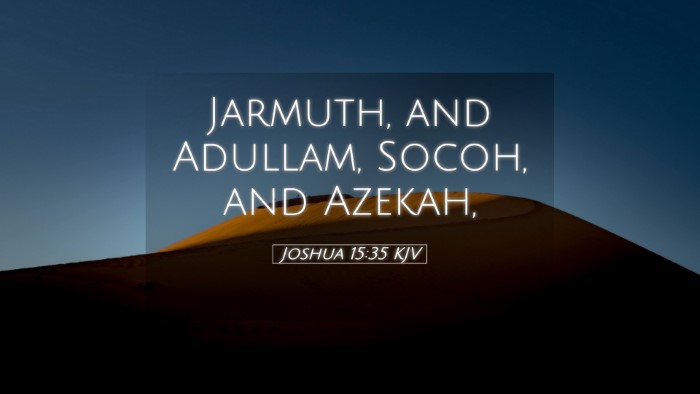Commentary on Joshua 15:35
Verse: "And Jarmuth, and Adullam, Socoh, and Azekah."
This verse forms part of the broader context of the territorial allotments given to the tribe of Judah as described in the book of Joshua. The cities mentioned here—Jarmuth, Adullam, Socoh, and Azekah—are significant both historically and spiritually. Understanding their significance can provide great insights for pastors, students, theologians, and Bible scholars.
Historical Context
In the period of conquest described in Joshua, these cities represent strategic locations within the land of Canaan. The tribe of Judah, being one of the largest and most important tribes, received a substantial portion of land that included fortified cities.
Insights from Different Commentaries
-
Matthew Henry:
Henry notes that these cities were key to the strength and security of Judah. He highlights the idea that they were not just geographic locations but also represented the heritage and promise of God to His people. The mention of these cities underscores the fulfillment of God's promises to Abraham, Isaac, and Jacob.
-
Albert Barnes:
Barnes elaborates on the significance of the cities. He remarks on Adullam, historically recognized as the cave where David took refuge and gathered his followers (1 Samuel 22). This connection reinforces the idea of these places having profound spiritual and historical narratives that shaped Israel's identity.
-
Adam Clarke:
Clarke emphasizes the geographical importance of the locations. He describes how these cities were strategically positioned to offer both protection and resources. This strategic aspect could be viewed as a metaphor for spiritual fortification—how God provides His people with strongholds against adversity. Clarke also mentions that they were critical centers for trade and interaction, making them more than mere residential spaces.
Theological Implications
The cities listed reveal a pattern of God's provision and His watchful care over Israel. Each city harbors its own story, contributing to the greater narrative of Israelite history and spiritual lessons applicable even today.
God's Promises Fulfilled
The allotment of these cities serves as a reminder that God fulfills His promises. The land of Canaan was promised to Israel, and each city mentioned reflects the tangible expression of divine fidelity. It invites believers to reflect on their own lives regarding the promises of God and the assurances they can claim.
Community and Identity
Each city stood as a testament to the community of Judah. In understanding their history and location, one can grasp the fullness of identity as a chosen people of God. The establishment of these cities solidified the collective memory and function of Israel as a covenant community.
Spiritual Warfare and Strongholds
Pastors and theologians might find valuable insights in the application of these cities as metaphors for spiritual strongholds. Just as Judah fortified these cities against external threats, believers today are called to build spiritual strongholds through prayer, community, and adherence to God's Word.
Conclusion
Joshua 15:35, though seemingly a simple list of cities, carries profound implications for understanding God's governmental structure, the fulfillment of promises, and the identity of His people. The insights from esteemed public domain commentators such as Matthew Henry, Albert Barnes, and Adam Clarke provide rich layers of meaning that enhance our appreciation of Scripture. As we reflect on these verses, may we find encouragement in God's faithfulness and inspiration to build our communities, both physically and spiritually, in accordance with His divine blueprint.


